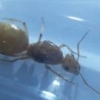1. Do nuptial flights ever happen at night? Is there any value in looking for queens at night?2. I've seen some ridiculously tiny ants with wings lately; ants so small that make my solenopsis molesta queen appear large. Does anyone bother keeping species such as these?3. My queens have a habit of dying in their test tube setups. How common of a problem is this in general? Maybe they incurred injury during their capture?4. Do larger queens tend to be more robust than those of smaller species?5. Do smaller ant species have proportionally smaller tunnels and chambers? Or do the diameters generally increase as the colony grows in number?6. How long will a new parasitic queen survive without a host? Will they ever lay eggs in the absence of a host? How long after capture should they be given their host?
7. How many of you folks regulate humidity in your formicariums using a hygrometer? I'd imagine that most do since different species prefer different humidity levels.8. Should the formicarium have a reduced temperature at night?9. If my solenopsis molesta queen escapes her enclosure, will she become a living pest inside my home? If so, maybe it's better to try a different species instead?10. How long do lasius cacoons take to hatch at around 80 degrees? How can I know of they're alive or dead? What are the signs?
11. Humidity is of vital importance in maintaining a proper formicarium, but is it also essential that they be able to also drink while in their nest? Has anyone had formicariums that provided good humidity, but didn't allow the ant to drink from the source of that humidity?
12. In nature, do parasitic queens occasionally fail to kill the host queen? Are there cases where the colony fights back and wins?
13. Has anyone ever tried keeping termites?
14. What is the average life expectancy of queen kept as a pet under the care of a competent ant-keeper?
15. Do ant-keepers have to control the colony's population by limiting resources, or do such colonies simply tend not to get very large in captivity without considerable effort?
16. Do grout formicariums offer any advantages over hydrostone formicariums?
17. Why don't folks with grout/hydrostone/Ytong formicariums just keep the formicarium propped up in a bed of water instead of using a water reservoir built into the formicarium itself? Wouldn't this provide a more consistent and longer lasting water supply, be easier to refill, and be more obvious when more water is needed?
18. Have there been any successful cases of ants breeding in captivity? It would be really cool if we could breed ants that are more resilient to our accommodations instead of tweaking our accommodations to more closely mimic the needs of the ants.
-Dan
Edited by Works4TheGood, August 13 2015 - 7:25 AM.

















